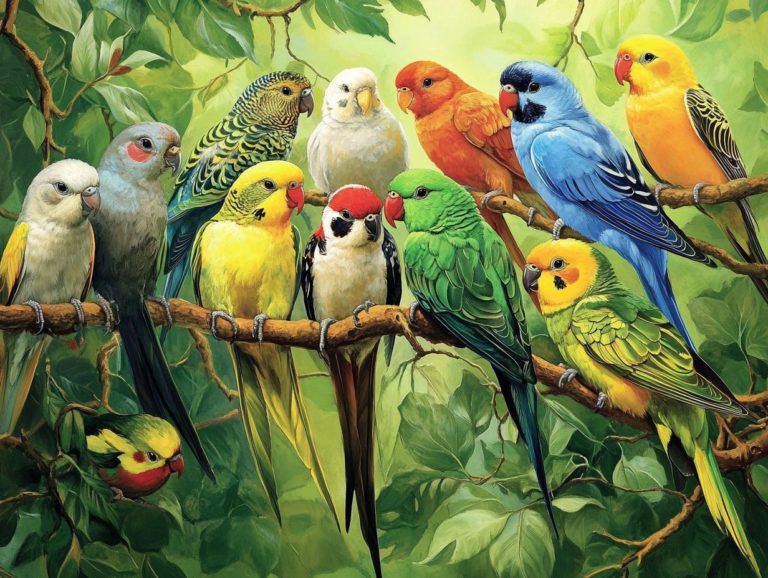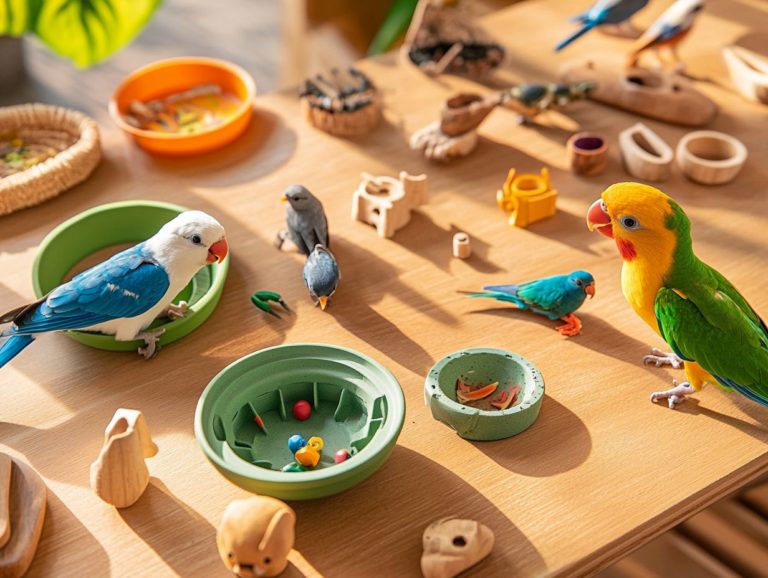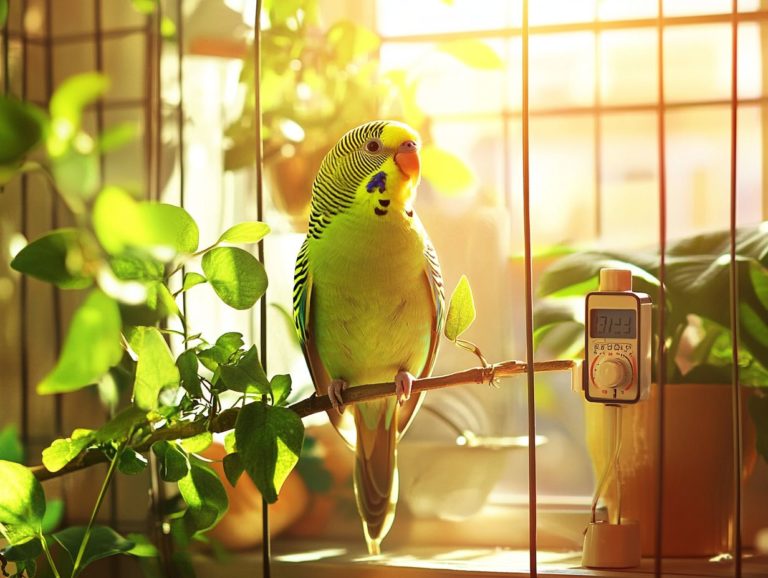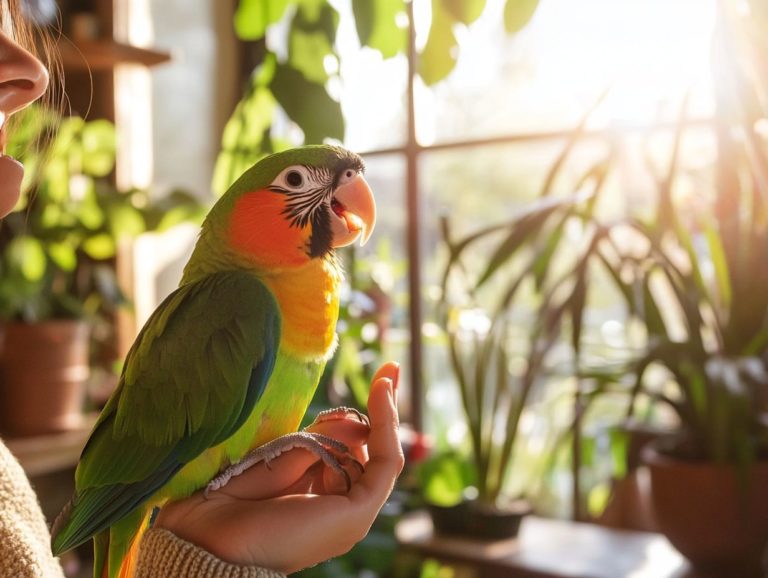How to Choose Between Parrots and Canaries?
Considering the addition of a feathered companion to your home? The choice between parrots and canaries, two popular species of pet birds, can be delightful yet daunting.
Each bird has its own unique allure and personality. This article explores the distinctive characteristics of both parrots and canaries, including their diet requirements and social interaction. We will examine their physical and behavioral differences to help you identify which might be the ideal match for your lifestyle.
Discover the joys of companionship! Find out which bird will enrich your life.
Contents
- Key Takeaways:
- Factors to Consider
- Parrots as Pets
- Why Canaries Make Wonderful Pets
- Comparing Parrots and Canaries
- Which Bird is Right for You?
- Frequently Asked Questions
- How to Choose Between Parrots and Canaries?
- What is the main difference between parrots and canaries?
- Do parrots and canaries have different care requirements?
- Which bird is better for first-time owners among avian pets?
- Are there any health concerns specific to parrots or canaries?
- What is the lifespan of parrots and canaries?
- Can parrots and canaries be kept together as pets?
Key Takeaways:
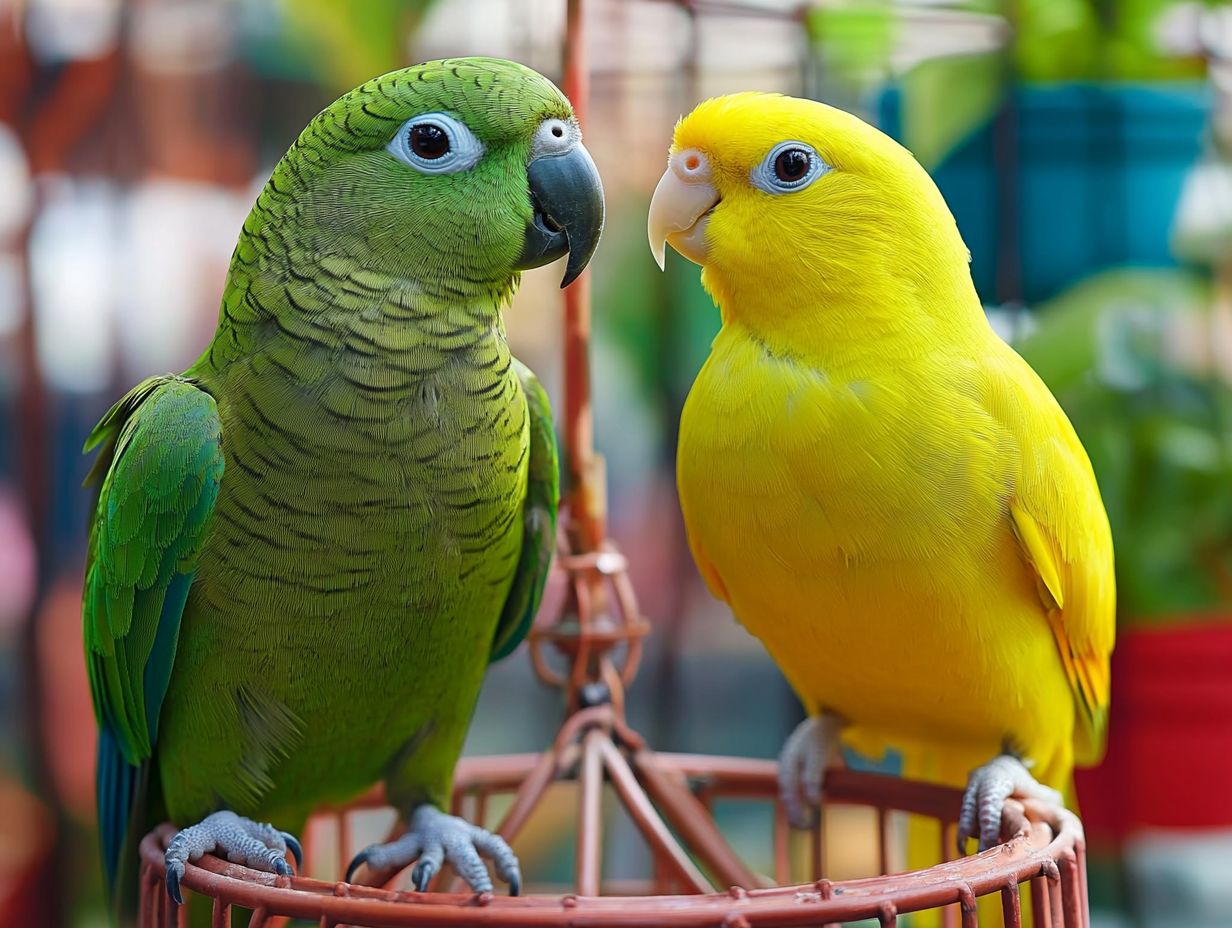
- Consider noise level, space, and interaction when selecting a pet bird.
- Parrots are intelligent and social. Canaries are low-maintenance with beautiful songs.
- Understand the differences in size, lifespan, and noise levels between the two.
Factors to Consider
When you re contemplating the addition of a pet bird to your home, it s essential to consider several critical factors such as species selection, various bird breeds, environmental needs, and the level of care your new companion will require.
Each type of bird whether a vibrant parrot, a melodious canary, or a gentle finch including species like cockatiels and lovebirds comes with its unique set of requirements. Understanding the details of pet ownership helps you make informed decisions about cage size for different bird species, social interaction, and daily maintenance routines for your avian companions.
This knowledge transforms your experience as a bird owner into something truly rewarding.
Parrots as Pets
Parrots are captivating and affectionate companions, celebrated for their stunning plumage and remarkable vocal abilities. Among the most cherished species, you’ll find the African Grey Parrots and Green-Cheeked Conures, each providing a distinctive experience of companionship.
These birds need attentive care and social interaction, and they flourish with mental stimulation through training methods and engaging toys that cater to their playful nature. For dedicated owners who value their playful spirit and social nature, these feathered pets represent an exceptional choice.
Characteristics and Care Requirements
Understanding the characteristics and care requirements of parrots is crucial for successful pet ownership, as these intelligent birds have distinct social needs. Take African Grey Parrots and Green-Cheeked Conures, for instance; they re not just chatty creatures that require a well-balanced diet. They thrive on daily socialization and mental stimulation.
By employing proper handling techniques and consistent training methods for affectionate birds, you can foster a strong bond, ensuring that your pet remains well-adjusted and happy. To meet their diverse dietary needs, it s important to research the specific nutritional requirements for your parrot species, including the right mix of fruits, vegetables, and fortified pellets, while considering their unique dietary needs as birds with a curved bill.
Socialization plays a pivotal role in their behavior regular interaction with both humans and other birds can help prevent issues like feather plucking and aggression.
Creating a stimulating environment filled with bird toys, perches, and safe spaces for exploration enriches their lives and encourages natural behaviors, making them well-socialized birds. By grasping these essential aspects, you ll discover the rewarding experience of sharing your life with these vibrant companions, who often delight you with unique vocalization patterns that reflect their mood and environment.
Your journey into avian companionship awaits. Ready to find your perfect feathered friend? Visit your local shelter or bird store today!
Why Canaries Make Wonderful Pets
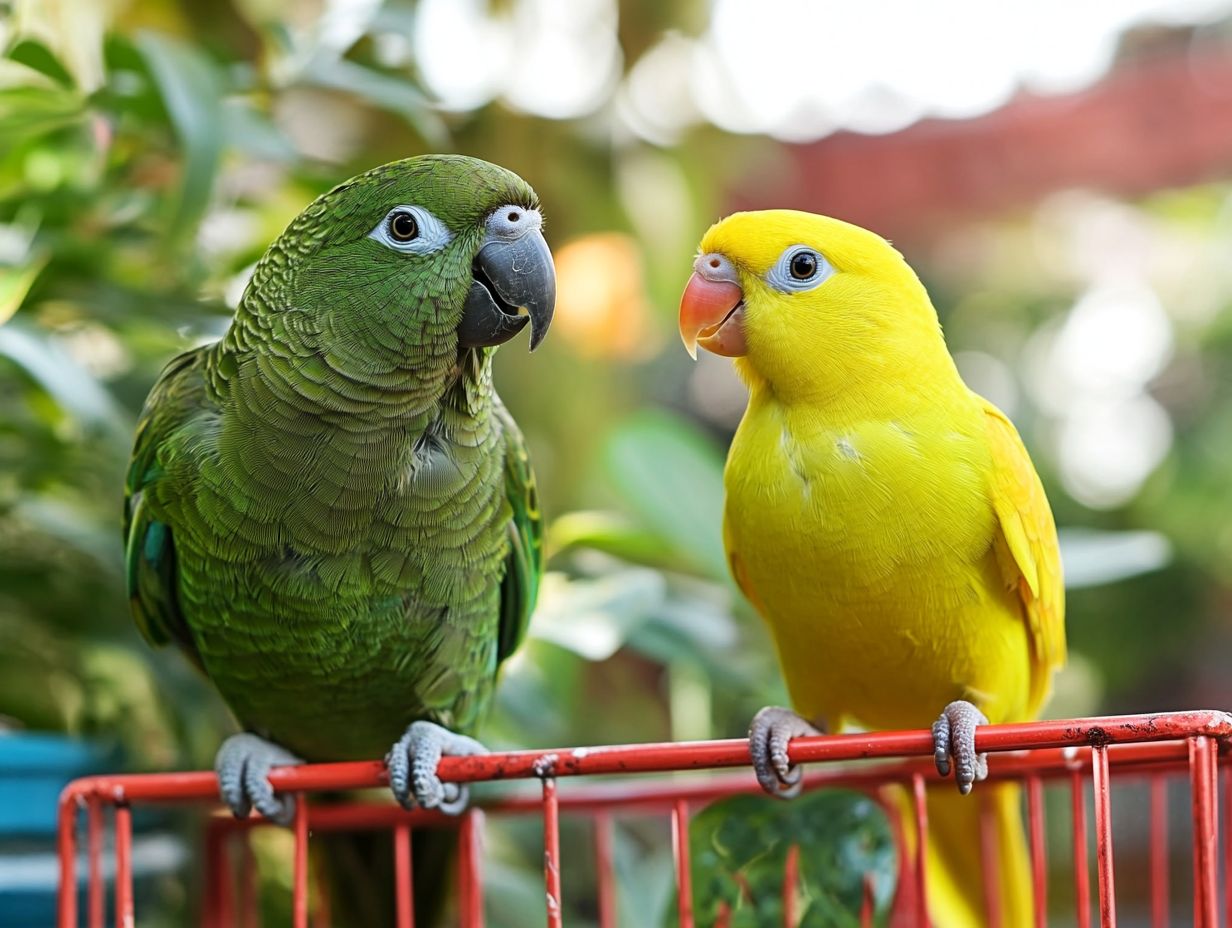
Canaries, renowned for their enchanting melodies and vibrant plumage, are truly among the most treasured pet birds. They effortlessly enhance the charm of any home.
These charming little songbirds come in different finch species, which are a type of small bird known for their singing abilities. Each species presents its own distinctive traits and care needs. To ensure their well-being, it’s crucial to grasp the specific requirements of canaries. This includes providing adequate cage dimensions that afford ample flight space and a diet that supports their vocal talents and overall health.
By attending to these details, you can create a nurturing environment where your canaries will truly thrive.
Characteristics and Care Requirements
Canaries are celebrated for their joyful songs and vibrant personalities. They make a delightful choice for bird enthusiasts like you. To properly care for these charming songbirds, you’ll want to meet their specific dietary needs, which primarily include high-quality seeds and fresh fruits.
Ensure gentle handling and enough social interaction. Regular interactions and providing suitable bird toys will help your canaries become well-socialized, allowing them to thrive in their environment.
These delightful creatures are not just known for their melodic tunes; they also have endearing temperaments. Canaries often showcase curiosity and playfulness. To keep them flourishing, it s essential to offer a varied diet that includes greens, high-quality seeds, and occasional treats like millet or veggies.
Don t underestimate the importance of routine handling; gentle, consistent engagement builds trust and facilitates easy socialization. By creating a lively environment filled with interactive toys and plenty of opportunities for exploration, you can encourage your canaries to express their vibrant personalities. This fosters a harmonious bond that enhances both their well-being and vocalization.
Comparing Parrots and Canaries
When you compare parrots and canaries as potential pet birds, it’s essential to consider their unique physical characteristics and behavioral traits. These factors greatly shape your experience as a pet owner.
Parrots, with their larger sizes, vibrant plumage, and engaging personalities, offer a dynamic presence. In contrast, canaries are smaller, showcasing intricate colors and delightful melodies.
Understanding the differences in how they sing and behave will help you choose the right bird for you. By learning about these differences in vocalization, care requirements, and social behaviors, especially between common pet birds like parrots and canaries, you can make a well-informed decision.
Physical and Behavioral Differences
The physical and behavioral differences between parrots and canaries are pivotal in shaping your decision as a potential bird owner. Each species boasts unique traits that cater to various pet ownership preferences.
If you re drawn to vibrant personalities and engaging vocalizations, particularly from affectionate birds like parrots, they might be your perfect match. Known for their dynamic companionship, they thrive on interaction and mental stimulation.
If you seek a calm companion, canaries, with their melodious songs, could be the ideal choice for you. Parrots, with their robust bodies and stunning plumage, are intelligent creatures that flourish when they receive social interaction.
Their vocal repertoire is nothing short of impressive, ranging from mimicking human speech to a delightful array of squawks and whistles. This showcases their communicative nature, making them one of the most engaging bird breeds. In contrast, canaries are smaller and more delicate, enchanting you with their sweet, soothing melodies. However, they tend to be less inclined toward playful exchanges.
Regarding territoriality, canaries might show defensiveness over their space, favoring solitude at times. Parrots, however, tend to be more adaptable. They form deep bonds with their owners and display extroverted personalities that lead to delightful, amusing interactions.
By understanding these distinctions, you can select the bird that aligns perfectly with your lifestyle and care capabilities, considering factors such as noise levels and companionship styles.
With the right care, your canaries will fill your home with joy and song! Consider adopting a canary or visiting a local pet shop to find your new feathered friend.
Which Bird is Right for You?
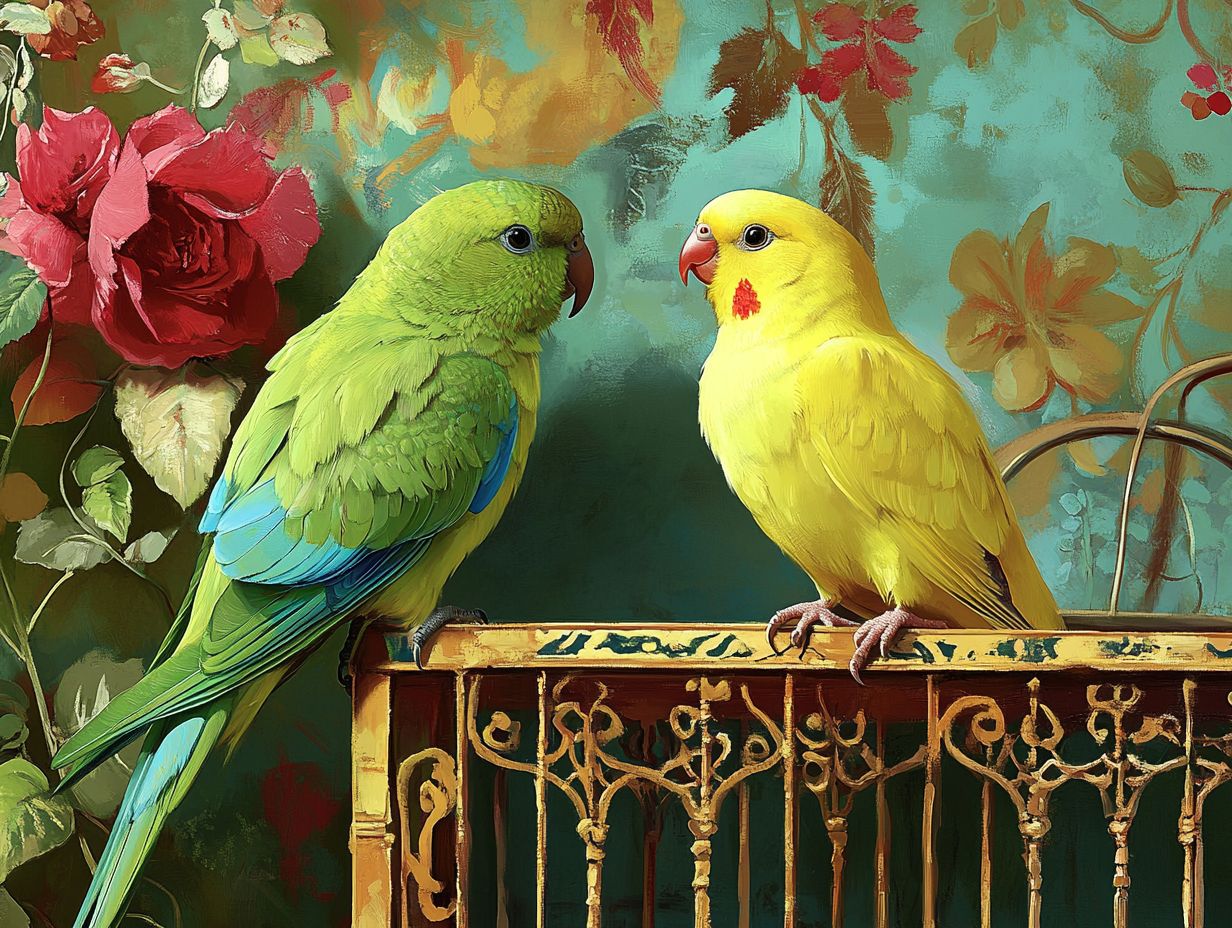
Choosing the right bird for your home demands thoughtful consideration of several factors, including your lifestyle, personal preferences, and the unique traits of the bird species that catch your interest.
Understanding the differences between parrots and canaries along with what care the birds need and their social interaction requirements can significantly enrich your experience as a pet owner.
Whether you desire the playful companionship of an affectionate parrot or the serene melodies of a gentle canary, making an informed choice is crucial for cultivating a fulfilling relationship with your feathered friend.
Assessing Your Lifestyle and Preferences
Assessing your lifestyle and preferences is crucial when selecting a pet bird, as each species comes with its own unique needs and how they interact with you. Consider factors such as how often you spend time with pets, preferred training methods, and your capacity to provide proper care.
These elements play a pivotal role in building a strong bond with your bird.
It’s important to think about how much time you can commit daily to interaction and play. Birds like budgerigars (budgies) thrive with regular socialization and mental stimulation. This means you’ll need to invest time in their training and bonding.
If your schedule is packed, quieter species, such as some finch species, might be a more suitable option.
Understanding the specific care requirements such as diet, cage size, and cleanliness can greatly impact not only your happiness but also that of your feathered friend.
Being mindful of these lifestyle factors will ultimately pave the way for a more enriching pet ownership experience, especially when considering companion animals like a type of parrot known for its curved beak and songbirds.
Frequently Asked Questions
How to Choose Between Parrots and Canaries?
Choosing between parrots and canaries can be a tough decision. Here are some commonly asked questions on how to choose the right pet bird for you to help you make the right choice.
What is the main difference between parrots and canaries?
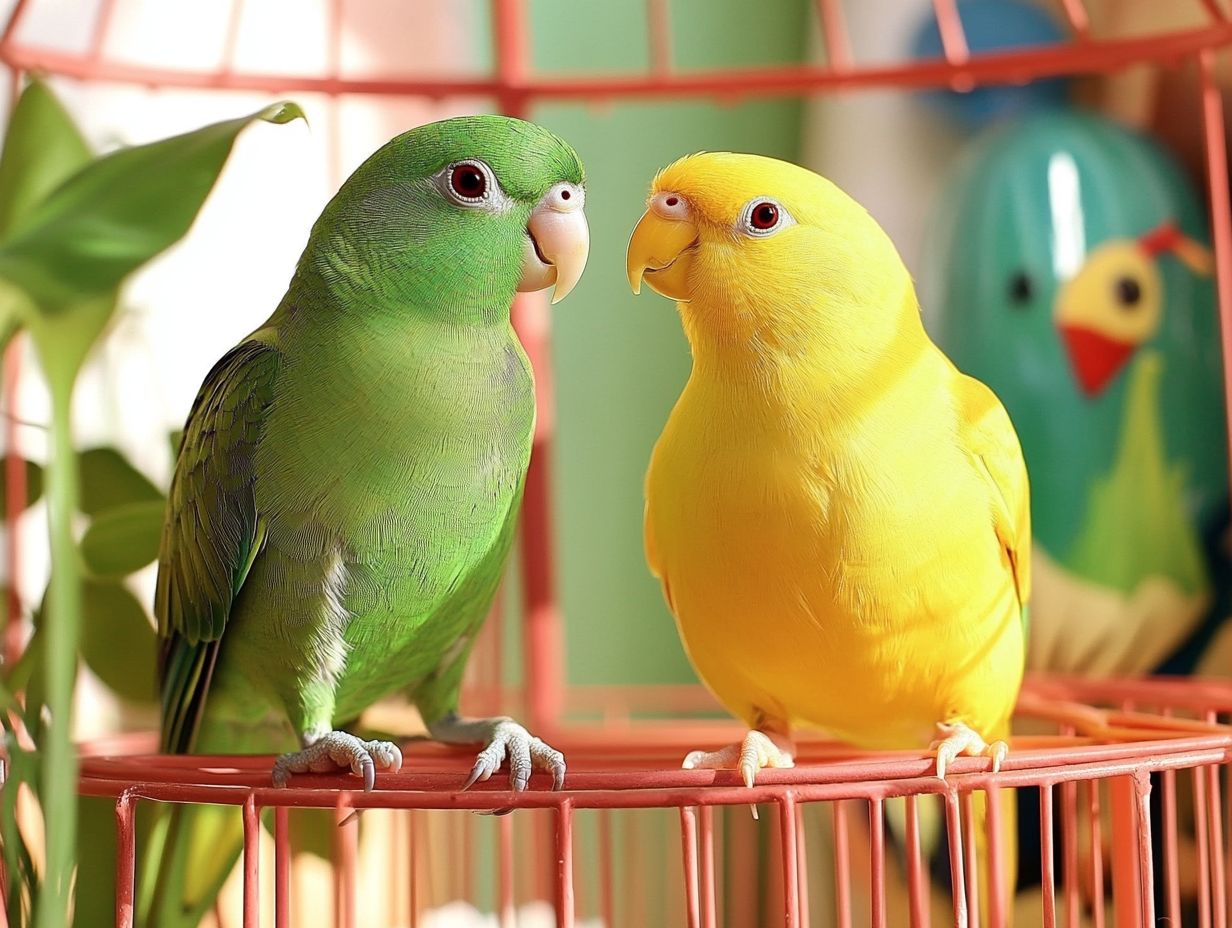
The main difference between parrots and canaries is their size. Parrots are larger birds with colorful feathers, while canaries are smaller and known for their melodious song.
Do parrots and canaries have different care requirements?
Yes, parrots and canaries have different care requirements. Parrots are more social birds and require more attention and socialization, while canaries are more independent and can be left alone for longer periods.
Which bird is better for first-time owners among avian pets?
This depends on the individual’s lifestyle and preferences. Canaries are often recommended for first-time bird owners as they require less maintenance and are generally easier to care for. However, parrots can also make great pets for responsible and committed owners.
Are there any health concerns specific to parrots or canaries?
Both parrots and canaries are susceptible to certain health issues. Parrots can develop respiratory problems if not provided with a proper diet and environment, while canaries are prone to respiratory infections if kept in a drafty or dusty area.
What is the lifespan of parrots and canaries?
Parrots have a longer lifespan compared to canaries, with some species like hyacinth macaws living up to 80 years. Canaries, on the other hand, have an average lifespan of 5-10 years, typical for many songbirds.
Can parrots and canaries be kept together as pets?
No, it is not recommended to keep parrots and canaries together as they have different needs and temperaments. Parrots can be aggressive towards smaller birds like canaries, and their diets also differ, making it challenging to provide them with suitable food and living conditions.
Start your journey to bird ownership today and find your perfect feathered friend!

